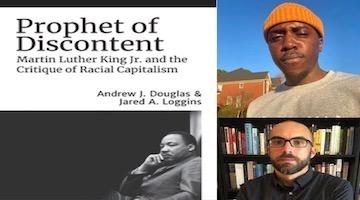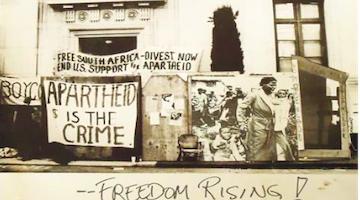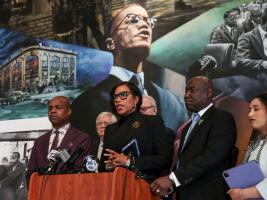Nobody was a bigger influence on Dr. Martin Luther King Jr. than Jack O’Dell, the communist -- which is why O’Dell had to be jettisoned.
“O’Dell minces no words about the role of anti-communism in US life and how much it cost him and the Black movement at large.”
The Issue of Mr. O’Dell, directed and produced by Rami Katz, is a remarkable film about an extremely remarkable activist, whose life and work deserve far more attention from those who seek to understand Black history, but also to make sense of the struggles and activists of today.
Some introduction to Jack O’Dell is useful. Few now remember that O’Dell was a close and crucial adviser to Dr. Martin Luther King, Jr., and for years remained near the peak of King’s influence.This, alone, would merit a documentary film about an inside voice and survivor of the time.
There is, of course, much more. As an interview in the film reveals, O’Dell is the creature of a particular time and place almost lost to us, several times over. He describes himself as the lone grandchild of a politically conscious Black family: His grandfather was the first Black janitor in Detroit, working at a public library. His uncles and aunts were courageously active by the time he was a teen, attending a fine high school. Going South for a visit in these years gave him one of the major jolts in his life: He had never imagined Black people would suffer so much direct, punitive segregation.
“O’Dell was a close and crucial adviser to Dr. Martin Luther King, Jr., and for years remained near the peak of King’s influence.”
O’Dell joined the war effort in 1943 by shipping out with the Merchant Marine. As a member of the National Maritime Union, a militant interracial union of a half-million members then led by the left, he learned his politics, from practice to theory. When not at work, he was reading W.E.B. Du Bois, a historian cursed in the scholarly mainstream for radical connections.
Here, what he had learned at home and in high school was driven home. He acquired a sense of real and potential working-class solidarity across racial lines, not merely as an ideal, but as a building block for a vast movement. He also learned what would soon be called, in the civil rights movement, “nonviolent direct action,” as he explains in the film. A strike, if done successfully, is already the perfect nonviolent direct action.
Meanwhile, the heroic moments for the US labor movement were passing swiftly, though hardly anyone in labor could suspect how swiftly. “Operation Dixie,”launched by the Congress of Industrial Organizations, was intended to change the South through unionization, and thereby change the Democratic Party by wiping out the power base of the Dixiecrats, the racist Democrats of the South. Instead, the post-war labor leadership abandoned the campaign quickly: It was hard going and labor leaders thought it involved too many “Reds,” those left-wing members and sympathizers of the Communist Party. O’Dell had to find another way forward.
“O’Dell learned his politics, from practice to theory, as a member of the National Maritime Union.”
He did. Part of his learning was to meet with the outstanding race intellectuals and activists of the day. A personal hero, W.E.B. Du Bois, would count most of all. O’Dell recalls becoming part of the Communist Party, not especially because of its global views including support of the Soviet Union, but because it was the one US organization selflessly dedicated to racial equality. Black people made real gains, as he says, from the work that communists, Black and white, did and against the greatest possible odds.
During the years immediately after the second World War, the civil rights movement resurged and gained new supporters and activists, as well as new and renewed enemies. Newer celebrities as varied as Jackie Robinson and Harry Belafonte were emerging — symbols of a volcano of energy and of warm acceptance from at least a leftish segment of the US population.
The post-war US elite, meanwhile, faced a new threat: anti-colonial stirrings in the global South, a restlessness that placed US segregation policies and the wider, pervasive US racism in a dangerously bad light. The Cold War furiously stoked the fires of repression at home across every social movement, and none more than movements for racial equality, South or North. But leading Democrats and others had to make some symbolic moves away from the status quo: thus, the measured and uncertain desegregation of the armed forces, or rather, sections of the armed forces, and a bit more rhetoric of racial equality in the 1948 Truman campaign for president. Such moves led to the third-party response of the Dixiecrats, with Strom Thurmond winning much of the South, while militantly anti-racist, Progressive candidate Henry Wallace, a few years earlier the most popular political figure after Franklin Delano Roosevelt, was Red-baited off the public stage.
“O’Dell recalls becoming part of the Communist Party, not especially because of its global views including support of the Soviet Union, but because it was the one US organization selflessly dedicated to racial equality.”
A fine documentary film of 20 years ago, Scandalize My Name: Stories from the Blacklist, narrated by Belafonte, Ossie Davis and Morgan Freeman, covers some of the same ground that we see, from another angle, in O’Dell’s description of the Cold War years. Both films tread a little uneasily at the decision of the Communist Party leadership to “go underground” after it became the focus of the FBI and how that decision seemed unrealistic to many Black activists within and around the Party.
That said, the anti-racist movements built by O’Dell and others, such as the Civil Rights Congress, suffered terribly. Only African Americans proclaiming their anti-communism were heard in the mainstream press, especially on foreign policy issues. The new civil rights movement emerged from under this cloud, with the strategic guidance of O’Dell perhaps as much as any individual around Martin Luther King, Jr.
O’Dell was part of the small group of mobilizers and organizers responsible for the fundraising and strategy of the Southern Christian Leadership Conference (SCLC). He departed from the Communist Party in order to do this work, as he explains in the film. For O’Dell, the idea that only “socialism” could bring racial equality now seemed mistaken, and new strategies had to be adopted.
“The anti-racist movements built by O’Dell and others, such as the Civil Rights Congress, suffered terribly.”
The axe nevertheless fell, as he describes, with the demands upon King to drop his trusted adviser. Film clips of King himself dealing with the controversial issue are painful to watch. Biographers who recall that King read the Daily Worker way back in his college days have given us a glimpse of King’s disguised political sophistication and how the emerging leader of civil rights felt he needed a great measure of caution. He released or expunged O’Dell from the SCLC with great reluctance and an understandable sense of guilt. O’Dell, speaking softly as always, minces no words about the role of anti-communism in US life, even years after McCarthyism was supposed to have ended, and how much it cost him and the Black movement at large.
If a change in the direction of O’Dell’s life was inevitable, how could he make the best of it? The answer appeared already in front of him, so to speak. W.E.B. Du Bois’s 1950s newspaper from Harlem, Freedom, was notable in many ways, politically and artistically, but doomed to narrow limits in its outreach. Du Bois’s personal shift to Ghana prompted the publication of something new, a monthlyFreedomways journal, with a more popular format and a long list of celebrities as well as African American intellectuals eager to contribute. This was, in 1961, truly the opening of a new era.
O’Dell was not quite in on the ground floor. But when he joined the editorial board, the writing of leading editorials — the key political statement of the issue — fell to him and his pen. O’Dell is understandably modest about his role in the magazine over two decades until its demise, and he does not discuss the role of the magazine much in this documentary.
“Dr. King released or expunged O’Dell from the SCLC with great reluctance and an understandable sense of guilt.”
We could wish there were more. The brief but brilliant popularity of Black Power did not overwhelm the Freedomwayseditorial group, seeking always to find some way to build new interracial coalitions and rebuild old ones. In the end, as the ’70s emerged from the violence and excitement of the 1960s, O’Dell’s wisdom was reaffirmed — and once again, he is too modest to make much of his critical role. The popular format, the illustrations and the inherent interest of the contents all made Freedomwaysperhaps the most consistently intriguing left-wing magazine of its time, from 1961 to 1985.
O’Dell became a “grand old man” of the left, in a sense, the political-intellectual counterpart and friend of Belafonte. Each had a unique and critical role through the final decades of the 20th century. Those who enjoy this film and yearn for more of O’Dell’s prose will find it best in Nikhil Pal Singh’s edition, Climbin’ Jacob’s Ladder: The Black Freedom Movement Writings of Jack O’Dell (2010). They can deepen their knowledge and insight at a good university or even a good public library, by spending a bit of time in the file of Freedomwaysitself. It remains a publication so charming, so convincing in its message, that anyone interested in the history of the freedom movement and the left can flip through the pages, learn and just enjoy what was done, and consider what can be done tomorrow.
[Paul Buhle is an editor of a dozen radical comics, most recently (with Lawrence Ware) of The Young C.L.R. James, drawn by Milton Knight.]
This article previously appeared in Portsideand Truthout.
COMMENTS?
Please join the conversation on Black Agenda Report's Facebook page at http://facebook.com/blackagendareport
Or, you can comment by emailing us at comments@blackagendareport.com



















